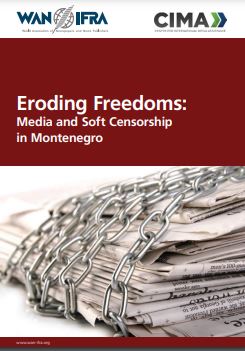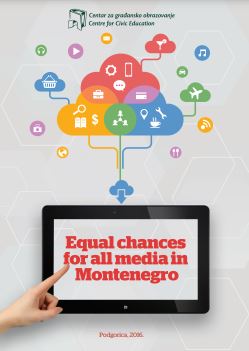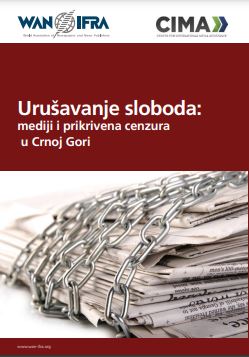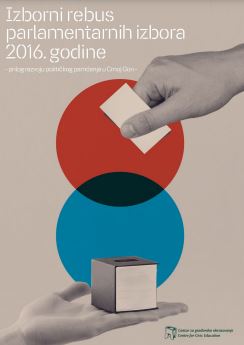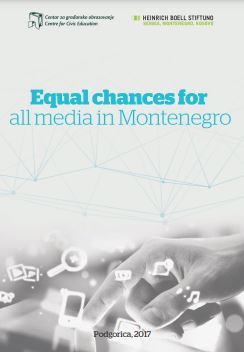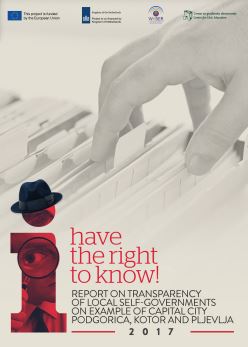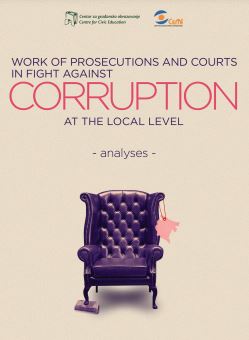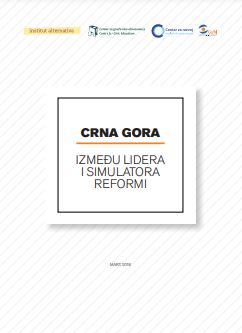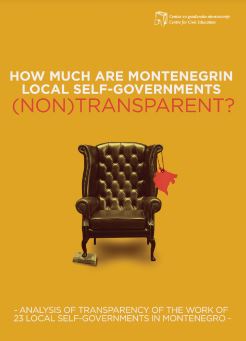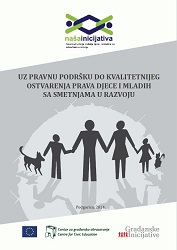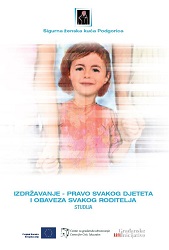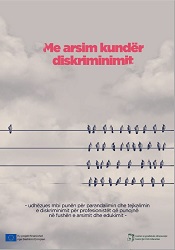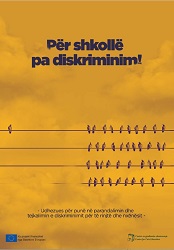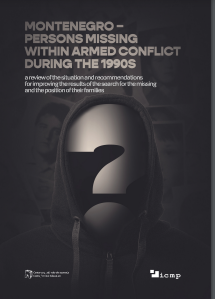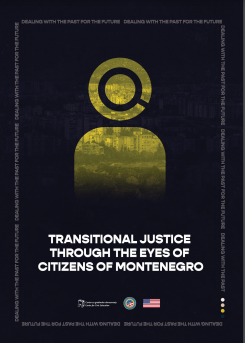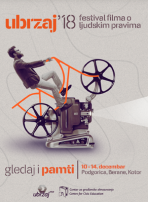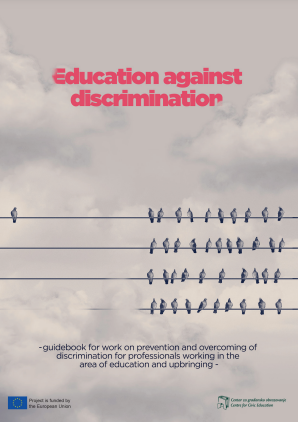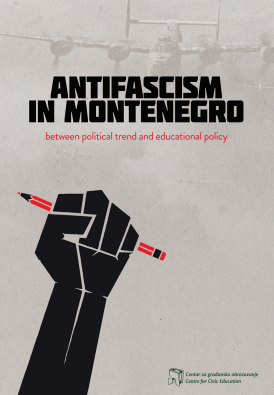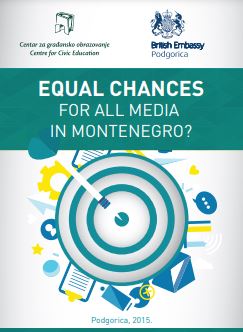
Equal chances for all media in Montenegro? - 2014 Annual report
Equal chances for all media in Montenegro? - 2014 Annual report
Keywords: Montenegro; media; 2014; report; RTCG; public broadcasting services; information access; law;
The project “Equal chances for all media” aims to contribute to the creation of clear oversight mechanisms for the public finances and for the allocation of state aid to the media, as required by the European Union regulations and the international standards and best practices. The more specific objective of this project is to raise the awareness among interested public about responsible management of the public budget, and analyse the relationship between the state institutions and the media in Montenegro as reflected in the financial allocations of public funds to the media in payment for specific services or through other forms of support. The public sector analysed in this study is defined by the Law on the Budget of Montenegro, and encompasses public institutions, municipalities (local self-government units), independent regulatory bodies, agencies and enterprises in which the state or the municipalities hold a controlling stake, the judiciary (courts and the prosecution), and others. The project builds on the previous work of the Centre for Civic Education (CCE) in this field, which produced annual reports for 2011, 2012, and 2013. These studies have raised the visibility of the problem of media financing in the Montenegrin public discourse, and became a reference for important international reports. Our findings highlighted countless shady areas in the public financing of the media in Montenegro, and stressed the need for better regulation in this area. They also highlighted the continuing attempts of the public bodies to exercise influence over media through selective and opaque financing, undermining the market competition, reinforcing unequal opportunities and thereby creating indirect pressure on editorial policies. The lack of transparency in financing as well as the lack of adequate criteria for the allocation of funds, alongside the incomplete legal framework, additionally undermines the already alarming state of the Montenegrin media. Considering that public administration and local self-government bodies spent EUR 2 642 070.83 in 2011 on advertising in a market that is altogether worth EUR 9 - 9.5 million, it is obvious that the state is a major, if not the largest customer for advertising services, capable of significantly influencing the revenues and the financial sustainability of individual media houses. In 2012 public spending on the media services decreased by nearly almost EUR 1 million to EUR 852 059.00 according to the CCE estimates, although this amount excludes the spending by local self-governments. In 2013, public administration and local self-governments bodies together spent EUR 2 196 739.00. This makes it clear that there was no reduction in the amount of public funds spent on advertising and other media services. On the contrary, if we bear in mind that the above amount includes only 67.6% of public sector entities from whom we could gather the data, the real expenditure is likely to be much higher. At the same time, our findings show a continued practice of opaque spending of public funds, without well defined rules and procedures. CCE’s findings drew the attention of the key international organisations. Among other, the European Commission’s 2015 Progress Report on Montenegro expresses: “concerns about transparency and nondiscrimination in state advertising... The precarious economic situation of journalists puts them at risk of editorial interference and possible self-censorship. The fact that many media outlets are not financially sustainable has a negative impact on the quality of reporting and professionalism.” Similar concerns were already expressed in the 2013 Progress Report, which found that “Concerns persist also regarding possible state aid and advertising funding allocated to print media in 2012, which were not in line with public procurement rules and could jeopardise competitiveness on the media market.” The 2015 Resolution on Montenegro of the European Parliament similarly warns that Montenegro should “adopt a clear legislative framework, which will establish rules related to media ownership and financing.” The international non-governmental organisation Reporters without borders ranks Montenegro 114th out of 180 countries on its World Press Freedom Index for 2015, which combines assessment on categories such as violence against media, pluralism, media independence, self-censorship, legislative framework, transparency and infrastructure. The only country in the region that was ranked worse than Montenegro is Macedonia, which came 117th. SEEMO Report on state of media in Montenegro for 2014 cited CCE’s findings, as did the last three reports of the US State Department on the state of human rights in Montenegro. Freedom House’s report “Nations in transit 2015”, lowered Montenegro’s rating on independence of the media from 4.25 to 4.50 on 1-7 scale (where 1 stands for best and 7 for the worst level of independence). Last but not least, CCE’s prior work on this problem led the renowned Paris-based international organisations World Association of Newspapers and News publishers and the Centre for international media assistance to choose CCE as the partner for their first report “Eroding freedoms: media and soft censorship in Montenegro”. In the interest of continuous monitoring of this area, CCE conducted a new study that compiles data for 2014 and provides the updated, comprehensive overview of the allocation of public funds to media in 2014, along with comparison to the previous years. The study is accompanies by specific recommendations on the ways to secure transparency and determine criteria for the allocation of public funds to the Montenegrin media that would be in line with the acquis communitaire on the freedom of expression and independence of the media, competition, state aid, and public procurement. Without a clear mechanism for the allocation of state aid to the media, these funds have the potential to create severe distortions of the media market, through discrimination and in violation of the EU competitiveness policy. This is all the more troubling when it is being done with public funds. The citizens, as tax payers, have the right to know how their money is spent, and whether the way in which the state allocates the public funds interferes with the impartial reporting of the performance of public institutions, or obstructs the development of media pluralism. This report warns of the existence of a mechanism used to control and exert pressure on the media, and provides recommendations on the ways to end bad practices that deprives Montenegrin citizens of their right to free and independent media and thereby of objective, accurate reporting on the activities of the government, political parties, institutions, as well as other issues of public importance.
More...
